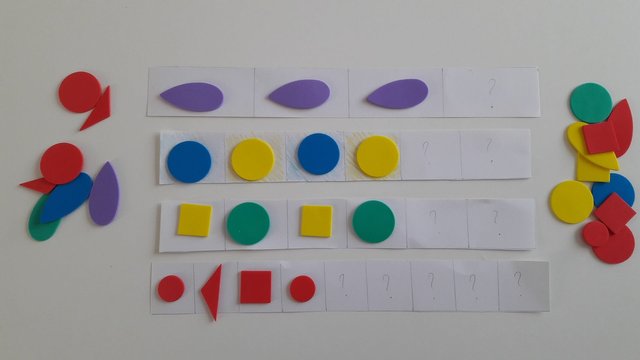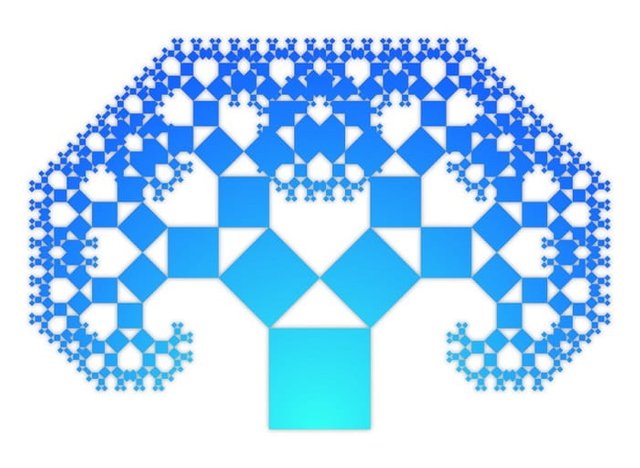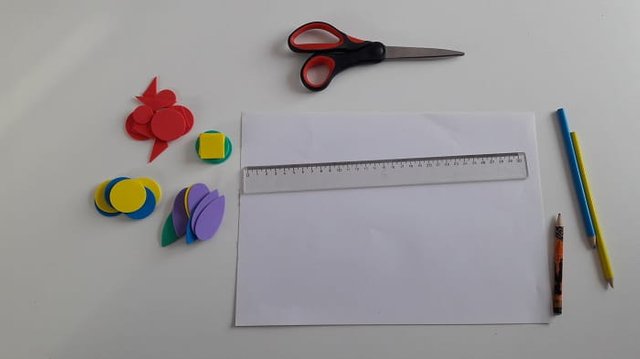Fun activities for Practicing Matching Patterns
Did you know math is often called “science of patterns”? Patterns are really all around us, we just need to recognize them. So let’s explore how to boost your pattern matching skills with some fun and simple activities
What is a pattern
As we said, one of the popular math definitions is that it is a science of patterns. Patterns of shapes, numbers, structures or even ideas are really at a hearth of the math. Their basic characteristic is that they repeat according to some rule (color, shape, size, category).
That means they are predictable, we can easily (or not!) continue the pattern by observing part of the sequence. Learning that we can predict certain outcomes based on our observation is a powerful concept. It helps children develop logical skills, improve their perception and understanding of the world around them. Nature is full of patterns. Famous examples include crystals and snowflakes, but there are also many examples from the animal kingdom, like zebra’s stripes.
One of the more interesting types of pattern are fractals - infinitely repeating pattern across different scales. This type of symmetry is called expanding or unfolding because the same (or very similar) pattern is repeating at a smaller and smaller scale. Fractals can be found in images, sounds, structures and nature and are considered prime examples of the mathematical beauty.
Why should you explore patterns with your child
Every child loves to match and sort stuff! Grouping similar objects come naturally and very early, it’s one of the basic psychological tendencies. Blue blocks go here, red blocks go there. Those are the simplest patterns. It’s good to talk to your child about those observed differences, but also similarities.
“Oh, yes, I see! They are not the same color, but what is similar about them? How many sides they have? Let’s compare these blocks with the balls!”
This will help them to think critically, be less impulsive and to pay attention to different characteristics of things (and people!).
Sorting and matching are the foundation of math reasoning. I know most of you think math and fun can’t possibly go together, but these activities are both beneficial and fun! What are we developing? Visual perception, motoric coordination, logical thinking, all the important stuff.
The great thing about these types of activities is that you actually don’t need anything fancy - use materials you have or do it in “your mind” - that way your child will also practice their working memory and attention.
Materials needed for Pattern matching activities:
As we just said, most of these materials are optional! You can put shapes on any surface and ask your child to continue the pattern. We used felt shapes, but you can use any material (for example, cut them from paper or cardboard and color them).
- Paper
- Scissors
- Ordinary and colored pencils
- Ruler
- Shapes of different colors and sizes
Instructions for doing activities:
Watch the video to see a complete guide and how to do a pattern matching activity, or continue reading description below.For each activity, we will take a piece of A4 paper and divided it into boxes (box should be big enough to house one shape and the number of boxes will be the length of the pattern).
ACTIVITY 1
Let’s start with something simple - a pattern of “1 repeated element”. Put element with the same shape, size, and color into first 3 boxes. Give your child several elements (of which one is correct) and ask to continue the pattern. You can vary difficulty by offering less or more elements. It’s easier if the offered elements vary in only one property - for example, color.
ACTIVITY 2
“Two repeating elements” pattern with the variation in color. As an added twist, color the first few boxes according to the pattern - first and third in one color, second and fourth in another. We used circles in blue and yellow color. Ask the child to put a shape on the matching color and continue the pattern.
ACTIVITY 3
Similar to the second activity “Two repeating elements” but this time variation is both in the shape and color... We used red circles and green squares. Again, start the pattern and ask the child to continue it.
ACTIVITY 4
Now we have “three (or more) repeating elements” pattern with variation in shape. As before, start the pattern and ask the child to finish it. To add to the difficulty, offer many different shapes, sizes, and colors to continue with.
All of these activities are only examples - there are tons of possibilities. Great way to add some fine motor skills practice is to ask the child to use tweezers when putting elements. Why?
Let’s pretend the table is an ocean and shapes can’t swim. The only way to help them is to put them on the little paper boats. But they really like to be in a certain order, that’s why we must follow this pattern.
Or something similar. 😊 The other good idea is to use some yarn to make a clothing rack. Make the pattern with the clothespins of different colors and sizes.
You can even use more abstract concepts like a pattern of fruit + veggie + protein when preparing a meal with your child and use it as a way to introduce healthy eating concepts!
Positive effects of Pattern matching:
- Improved perception
- Improved logical and mathematical reasoning
- Can be paired with bonus activities, like color recognition or practicing pincer grasp
- Good “trick” to guide your child to do certain actions (order toys, choose what to eat, pick clothes) - let’s do it in a pattern!
We hope you and your child enjoyed doing this activity. Soon, you’ll notice patterns all around you! If you want more brain-boosting activities, try to build and solve Tower of Hanoi or dive into cryptography (more patterns!) by making your own Cipher Whee.
original article can be found at https://www.stemlittleexplorers.com/en/activities-for-matching-patterns/



Hi! I am a robot. I just upvoted you! I found similar content that readers might be interested in:
https://www.stemlittleexplorers.com/en/activities-for-matching-patterns/